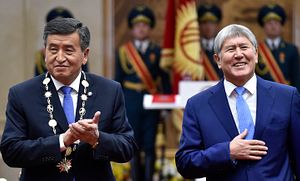It might be a new year, but Kyrgyzstan’s legal system and former President Almazbek Atambayev are still locked in stalemate.
Back in August, The Diplomat’s managing editor Catherine Putz took stock of high-profile arrests and investigations in Kyrgyzstan. At the time, Kyrgyz authorities and society were still catching their breath after Atambayev was taken into custody on August 8 following a disastrous attempt to detain him the day before. While Atambayev had been facing a range of charges related to corruption before the early-August raids, the events of August 7 — which left almost 90 people injured and one special forces officer dead — got the former president a second set of charges, including using violence against representatives of the authorities, organizing mass unrest, attempted murder, hostage taking, and illegal use of firearms.
Since being taken into custody, Atambayev and Kyrgyzstan’s legal system have effectively fallen into a cycle of lather, rinse, repeat: The former president refuses to participate in the trial, the judge reschedules the trial for a later date, and authorities extend Atambayev’s pre-trial detention for another few months.
On August 29, Prime Minister Muhammedkaly Abylgaziev ordered a commission to investigate the events at Koi-Tash, the location of Atambayev’s home outside Bishkek and the site of the two raids to detain him. By the time the commission had finished its work on October 31, Atambayev had refused to leave his cell to participate in preliminary hearings twice — once on September 11 and again on October 14. At this point, Atambayev’s lawyer, Sergei Slesarev, smugly called the situation a “legal vacuum” that no one knew how to solve, as though it would get his client off the hook.
Atambayev’s trial was postponed again on November 15, but this time due to the illness of Abdukhalim Raimzhanov, another defendant in the case. November 29 marks the only occasion when Atambayev deigned to show up to court, though he derailed proceedings by refusing to answer any of the judge’s questions.
On December 19, Atambayev’s absence resulted in another cancelled court session. As a result, authorities decided to move the trial from Pervomaiskii District Court in Bishkek to the State Committee for National Security (GKNB) building where Atambayev is being held in pre-trial detention. Atambayev’s lawyers fiercely criticized the decision to move the trial’s location, complaining that the GKNB building is not equipped for court proceedings and lacks any video or audio recording capabilities to ensure media coverage of the trial.
While Atambayev managed to make it to court on January 9, the former president ended up getting kicked out of the courtroom when he tried to leave.
This episode encapsulates the absurdity of this trial, both at the hands of Kyrgyzstan’s legal system and the former president. Expelling Atambayev from the courtroom after he had already left it just solidifies the perception that legal officials do not have control of the situation; moving the trial to a space outside the district court fuels concerns that the effort to bring Atambayev to justice are illegitimate. Atambayev’s tactic of creating a “legal vacuum” by refusing to participate in court proceedings is immature at best, and destabilizing at worst. Other high-level officials facing trial for corruption have picked up on the strategy, creating deadlock in the legal system.
Also worrying is the persistence of the narrative that charges against Atambayev are invalid because they were politically motivated. Atambayev’s lawyers have pushed the argument that Atambayev is doing nothing wrong by refusing to show up to court, because his arrest is an example of political theater as current President Sooronbay Jeenbekov has tried to consolidate power. While Kyrgyzstan certainly has issues with judicial integrity — the rule of law is not applied equally and political elites use criminal charges to target individuals who’ve fallen out of favor or pose a threat — boosting this argument ignores the ways that Atamabayev’s current situation is wrapped up in the corruption and deterioration of the rule of law which he organized as president.
In the meantime, Atambayev’s pre-trial detention was extended again to March 15, suggesting no clear end in sight to the former president’s silent treatment toward the justice system.
































